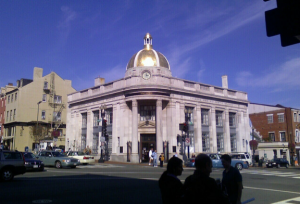There is no Georgetown conspiracy to keep out POCs.

DCentric
M Street and Wisconsin Avenue, Georgetown.
Before moving to Columbia Heights, I lived in Georgetown, a neighborhood I have always loved without any embarrassment or hesitation. I can’t count how many times I was either teased or questioned about being a POC (Person of color) living in the one part of the city where “they don’t want minorities”; then I’d hear a familiar tale about “the only reason Georgetown isn’t on the Metro is to keep it white.” I’d sigh and explain that while that theory was popular, it was a myth; there were logistical issues behind the lack of trains in popped-collar-land. Besides, when I lived there, there were plenty of teenagers roaming M Street or Wisconsin Avenue– and they were minorities. So it’s not like the lack of a metro stop was a particularly effective strategy for keeping the chocolate away from the vanilla.
I see that the Georgetown Metropolitan is sick of that unnecessarily divisive and inaccurate explanation as well, since he tackled it admirably in his post, “All You Need to Know About the Georgetown Metro Stop“.
Why There is No Georgetown Metro
If you take anything away from this article, please let it be this: the reason there is no Metro station in Georgetown has absolutely nothing to do with neighborhood opposition. Nothing. No “rich Georgetowners wanted to keep out minorities”-conspiracy. No matter how much it fits with the popular stereotype, it’s just not true.
As rigorously documented in Zachary Schrag’s Great Society Subway, the planners behind Metro simply never seriously considered putting a station in Georgetown. The reason: the Potomac. To get under the river, the Metro tunnel has to start heading down far enough away so that it’s not like a roller-coaster.
Commercial Georgetown is very close to the river and on a steep hill, which wouldn’t give the tunnel much distance to reemerge from underneath the river. Thus a Georgetown station would be extremely deep. It would be physically possible to build, but it would be extremely expensive…That’s it. No matter how affirming of all the stereotypes of Georgetowners the myth is, it’s absolutely false.
See? Blame the Potomac, not racism. D.C. has many real issues with regards to race and class that need to be addressed; we don’t need to invent– or in this case, perpetuate– fake ones.
-
KH
-
http://DCentric.org Anna John
-
Anonymous
-
historystudent








